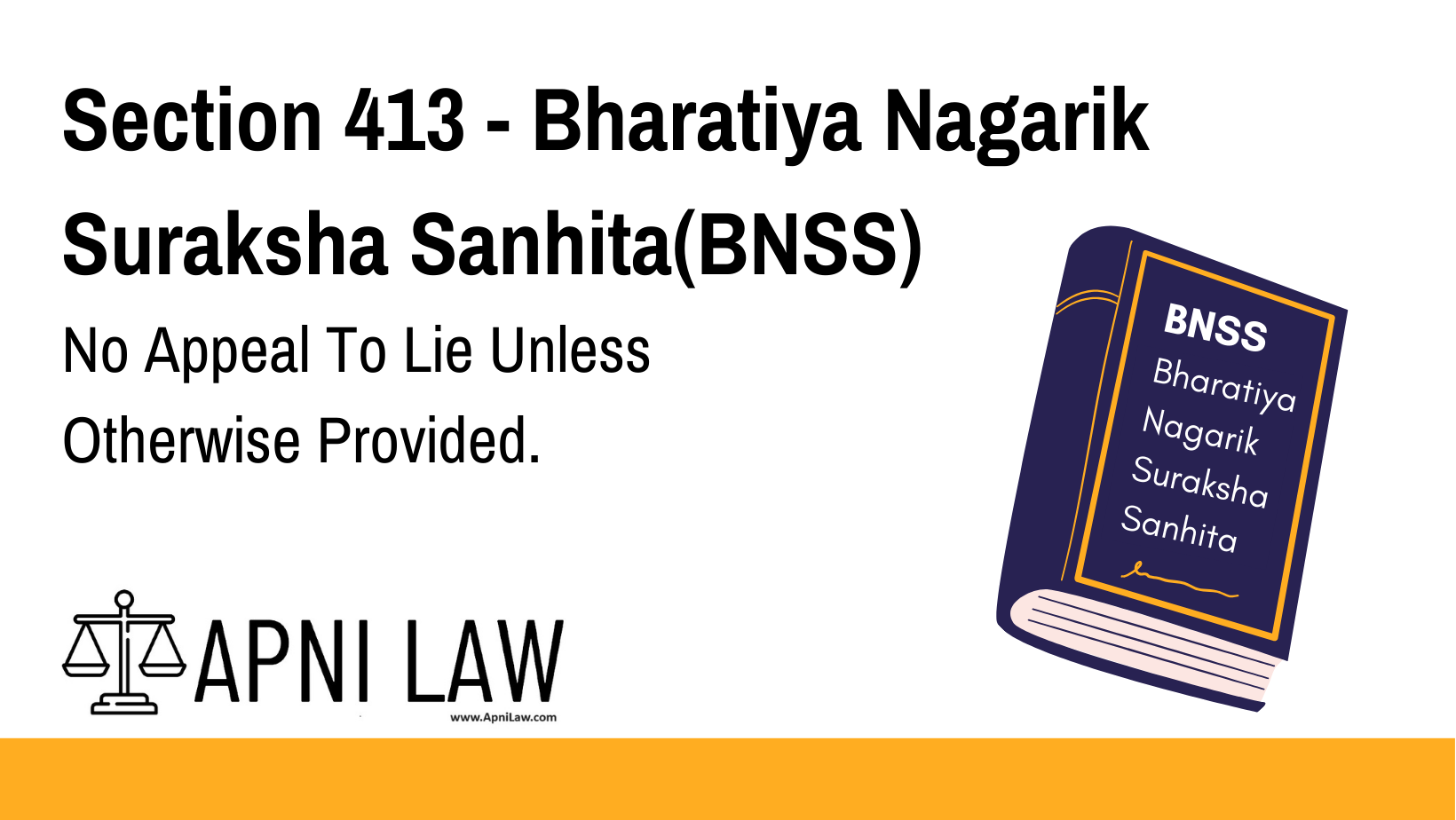Code: Section 413 BNSS
413. No Appeal To Lie Unless Otherwise Provided
No appeal shall lie from any judgment or order of a Criminal Court except as provided for by this Sanhita or by any other law for the time being in force:
Provided that the victim shall have a right to prefer an appeal against any order passed by the Court acquitting the accused or convicting for a lesser offence or imposing inadequate compensation, and such appeal shall lie to the Court to which an appeal ordinarily lies against the order of conviction of such Court.
Explanation of Section 413 BNSS
Section 413 of the Bharatiya Nagarik Suraksha Sanhita (BNSS), 2023 establishes the general rule that no appeal can be filed against a judgment or order of a Criminal Court, except where specifically permitted by law. However, it also provides an important exception for victims, granting them the right to appeal in certain situations.
Key Provisions
-
General Rule: No Appeals Unless Allowed by Law
- An appeal is not an inherent right; it can only be filed if explicitly permitted under BNSS or other applicable laws.
- This ensures that not every minor grievance leads to prolonged litigation.
-
Exception: Victim’s Right to Appeal
- A victim has the right to appeal against:
- Acquittal of the accused.
- Conviction for a lesser offence (e.g., accused convicted for causing hurt instead of attempt to murder).
- Inadequate compensation awarded by the Court.
- A victim has the right to appeal against:
-
Appeal to the Appropriate Court
- The victim’s appeal must be filed in the same Court where a normal appeal against conviction would lie.
- For example:
- If a Sessions Court acquits an accused, the victim’s appeal would go to the High Court.
- If a Magistrate Court acquits an accused, the appeal would go to the Sessions Court.
Illustrations
Example 1: Acquittal of the Accused
- A person is charged with Section 302 BNSS (Murder).
- The Sessions Court acquits the accused due to lack of evidence.
- The victim (or their legal representative) has the right to appeal against this acquittal before the High Court.
Example 2: Conviction for a Lesser Offence
- A person is charged with rape, but the Court convicts him only for outraging modesty under Section 74 BNSS (Outraging the Modesty of a Woman).
- The victim can file an appeal to seek a harsher conviction.
Example 3: Inadequate Compensation
- A victim suffers serious injuries in an assault case.
- The Court convicts the accused but grants minimal compensation.
- The victim can appeal for enhanced compensation.
Common Questions and Answers on Section 413 BNSS
1. Does every criminal case allow an appeal?
No, an appeal can only be filed if specifically allowed under BNSS or any other law.
2. Can the accused always appeal against their conviction?
Not always. Some minor offenses have no right to appeal if the punishment is below a certain threshold.
3. Can the victim challenge an acquittal?
Yes, under Section 413 BNSS, a victim can appeal against an acquittal, a lesser conviction, or inadequate compensation.
4. Where should a victim file an appeal?
The victim’s appeal must be filed in the same Court where a regular appeal against conviction would go:
- Sessions Court judgments → Appeal in High Court.
- Magistrate Court judgments → Appeal in Sessions Court.
5. Can a victim appeal even if the prosecution does not?
Yes, even if the State (Prosecution) does not file an appeal, the victim can independently appeal under this section.
Conclusion
Section 413 of the Bharatiya Nagarik Suraksha Sanhita (BNSS), 2023, establishes a structured approach to criminal appeals by restricting them to cases where they are explicitly permitted by law. This provision ensures that judicial proceedings are not unnecessarily prolonged while still safeguarding the rights of victims by allowing them to appeal against acquittals, lesser convictions, or inadequate compensation. By clearly defining where and how appeals can be filed, this section maintains a balance between judicial efficiency and access to justice. Ultimately, it reinforces the principle that while appeals are an important legal right, they must be exercised within a well-defined legal framework.
For more legal insights, visit ApniLaw! 🚀








